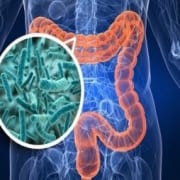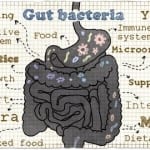“Gut Feelings”: An Excerpt From Total Recovery
The following is the first in a series of excerpts on gut health from Dr. Gary Kaplan’s book “Total Recovery: A Revolutionary New Approach to Breaking the Cycle of Pain and Depression.”
“We now know that our intestinal tract has 100 million nerves – more than our spinal cords or peripheral nervous systems. With this radically new understanding, scientists have tentatively begun to refer to it as the body’s second brain.
As Michael Gershon, MD, explains in his book The Second Brain, the intestinal tract is far more independent than anyone had realized. It is even equipped with its own senses and reflexes.1
Surprisingly enough, our digestive systems manufacture just as many neurotransmitters as our brains. With the advent of “designer drugs” – such as selective serotonin reuptake inhibitors (SSRIs) – we have come to think of depression, anxiety, and insomnia in relation to the amount of serotonin circulating in the brain. Only recently has it become apparent that 95 percent of the body’s serotonin is manufactured not in the brain, but in the gut.2
Now it makes sense that the side effects of SSRIs often include intestinal problems.
In America more than two million people have irritable bowel syndrome (IBS), which may be caused, in part, from too much serotonin in the intestinal tract. As Adam Hadhazy points out in Scientific American, this means IBS – like other diseases caused by an imbalance of neurotransmitters in the gut – could almost be considered “mental illnesses” of the second brain.3
IBS may also signal an inflammatory process in the spinal cord or brain itself. An emergent theory on the cause of IBS is that it is a form of central sensitization. Inflammation in the spine increases sensitivity of the nerves controlling the muscles that line the intestinal tract and ensure the smooth flow of food throughout our digestive system. When the nerve signals from the spinal cord and brain to the intestines are disrupted, it can cause the intestinal muscles to spasm, resulting in pain and cramping. The muscles respond by becoming overactive (diarrhea) or underactive (constipation).4
As researchers have turned their attention to serotonin levels in the gut instead of in the brain, it has led to even more surprises. In a study of rodents at Columbia University Medical Center, scientists found that when they gave rodents with osteoporosis a drug that inhibited the release of serotonin in the gut, the disease disappeared. Gerard Karsenty, MD, lead author of the study and chair of the Department of Genetics and Development at Columbia, admitted, “It was totally unexpected that the gut would regulate bone mass to the extent that one could use this regulation to cure – at least in rodents – osteoporosis.”5
Dr. Gershon says, “We have never systematically looked at [the intestinal tract] in relating lesions in it to diseases like we have for the [central nervous system].”6 Once we have had time to investigate the implications of the second brain, important connections to diseases will be linked to the state of our gut.
We know that problems in the intestinal tract can go much further than heartburn and indigestion or constipation. Crohn’s disease, IBS, and ulcerative colitis also arise from imbalances in the gut.7 Early studies have suggested that imbalances in intestinal bacteria can cause “arthritis, diarrhea, autoimmune illness, B12 deficiency, chronic fatigue syndrome, cystic acne, colon and breast cancer, eczema, food allergy or sensitivity, inflammatory bowel disease, irritable bowel syndrome, psoriasis, and steatorrhea.” None of these conditions were previously recognized as being related to gut bacteria.8
Gradually, physicians reading the latest research are becoming aware that migraines are frequently triggered by food sensitivities that inflame the gut.9
Diseases like chronic fatigue syndrome, asthma, and fibromyalgia have a significant relationship to the intestinal tract. When balance is restored, the symptoms are often resolved. Any improvement in the health of our intestinal tract increases the effectiveness of our immune systems.
The question currently being investigated by researchers is: Can we analyze the stool to create a map of all the different types and amounts of bacteria in the gut and use it to predict illness? We’re hoping it can be done.”
1 Michael D. Gershon, MD, The Second Brain (New York, HarperCollins, 1998).
2 Lipski, Digestive Wellness.
3 Hadhazy, “Think Twice.”
4 Ibid.
5 Ibid.
6 Ibid.
7 Lipski, Digestive Wellness.
8 Ibid.
9 Ibid.
Reprinted from Total Recovery: A Revolutionary New Approach to Breaking the Cycle of Pain and Depression by Gary Kaplan, D.O., with permission from Rodale Books. Copyright (c) 2014 by Gary Kaplan, D.O.











Leave a Reply
Want to join the discussion?Feel free to contribute!